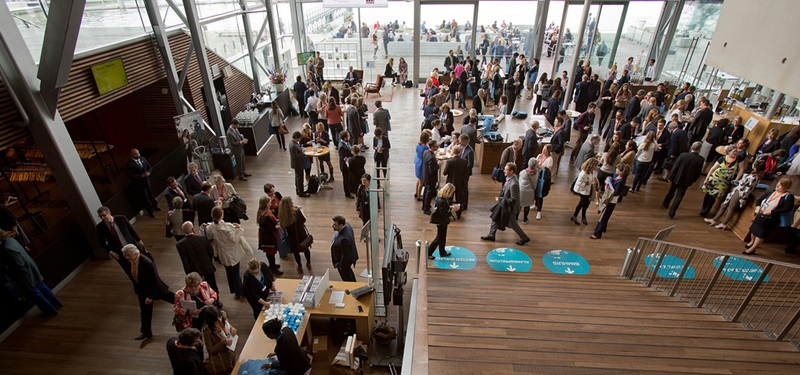OK, wine comes first, followed by tracking down the best hors d’oeuvres. But then, we reconnect with old friends, get introduced to new ones, and casually squint at name badges to remember those we see only on this annual basis. 5-15 chit chats later and we head out, either to enjoy a meal with our “go-to” crew or to get some rest before the conference kicks into full gear. This is the formula for the ubiquitous Welcome Reception, and you know what? It works, and catalyzes important work we can do together.
Last night’s conference kickoff offered both a positive start to the next few days, and also some valuable lessons about what works in getting a group of people together.
No hard sell. Especially after travel, people are restless. They want to unwind, and have a place to go without having to be responsible for anything once they’re there. What EFC does so well – especially at these welcome events – is that it leaves people alone! Nobody tries to make remarks above the volume of the crowd, pass out swag, or host formal icebreakers.
Limited space. The physical space of events matters, and sometimes, less is more. Especially in a context where some people know a lot of people and some people don’t, making sure everyone can find conversation if they want it is essential. In a large space, it’s easy to drift off, check email, and simply people-watch. In a more contained space, it’s much easier to (literally) bump into people, introduce yourself, and be introduced because it’s impossible to ignore someone standing right near you. This makes a welcome event more welcoming, and conversation a little
easier.
Connecting, not ‘networking’. Small dig – name badges can be pretty hard to read. Especially at welcome events where not everyone has one yet, they don’t do a ton of good…..or do they? Without having all information laid out (Who are you? Where are you from? Why are you here? What do we have in common?), we have to instead discover this ourselves. It’s not about just getting a business card; when wine and a snack are in hand and there’s no timer rushing you to move on to the next person, we connect on a human level. Conversations about accents, places, glasses fashion, travel woes, other recent events, kids calling to say good night, board service, haircuts, and more become the norm. If relationships are how work gets done, and relationships take building knowledge and trust, it starts with connection, not asking what’s in a funding portfolio.
Social curators. At any conference, there are always people who ‘know the ropes;’ the question becomes what they do about it. Last night, I saw EFC staff and the conference ‘regulars’ actively making connections at opportune moments, and making sure to pull into conversation those who might be less familiar. This happens without grand gestures or specific training, but it’s embedded into the culture of this conference and of these events. One of my biggest pet peeves is when staff of the host group are ‘working’ an event and not enjoying it; when they participate as they did last night, everyone benefits because they can more seamlessly engage others and set a tone for the room.
Next steps. Events that leave your head swimming but with no clear path forward don’t optimize the time spent strengthening old connections and forging new ones. We’re lucky to have a highly functioning and already much used conference app, where you can look up people you talked with and shoot them a ‘great to meet you’ message.
(Note: if you didn’t do that but think ‘What a good idea!’, you’re not too late!) Some people used the app, too, to share a photo or rumination, voice conference expectations and excitement, and crowdsource breakfast or coffee buddies. Integrating technology at an event is a sure way to give everyone a next action that’s easy to do.
The rosé was great, but it’s not just about the rosé. It never is. My takeaway: the little things that you do and don’t do in planning for and executing an event make all the difference. How might you take this back to your own convenings? What else did you takeaway that you want to add? Comment away!
Jen Bokoff is director of knowledge services at the Foundation Centre.@jenbo1







Comments (0)